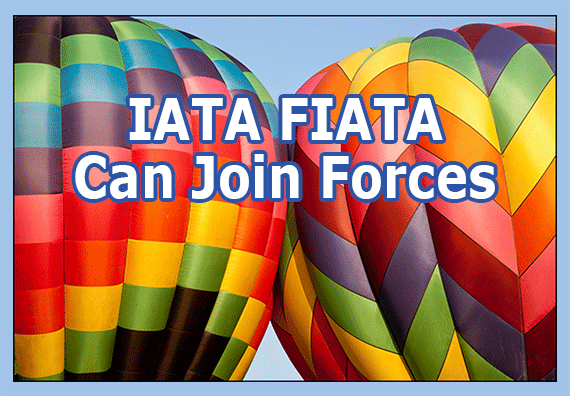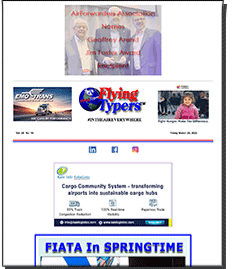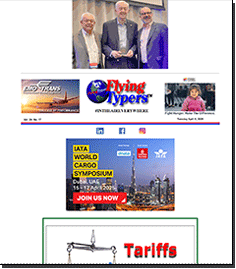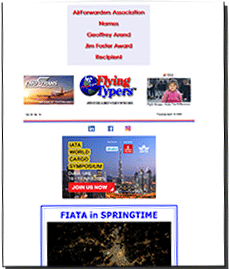 |
“Thriving in an uncertain future” is the subtitle of one of the event streams at IATA’s WCS in Dubai and it captures everyone’s attention today with this message: “Aviation is committed to net zero carbon emissions by 2050, including the air cargo sector. At the World Cargo Symposium, Marie Owens Thomsen, IATA’s Chief Economist and SVP, Sustainability, put this challenge into context.”
Having in mind one of the opening sessions at the recent FIATA’s HQ in Geneva, no doubt our forwarders friends in the Dubai attendance will listen carefully, considering their clear commitment to reduce emissions to achieve sustainable air cargo in future. They will listen carefully, even though their mind will still focus on their common air cargo programme that has not been achieved yet. Torn between these two capital issues, their commitment to building a sustainable, thriving future for air cargo cannot be questioned.
In preparation of the event we tried to talk to some of our usual contacts and managed to get the views from a seasoned practitioner, which we are trying to put in context in the following Q&A session.
FT: During FIATA meeting in Geneva there was a long and interesting debate about emissions. Is the issue of emissions still vital for airlines or will the situation change in time toward a more “traditional” approach? In particular, it was noted that CORSIA would NOT be discontinued: do you agree?
Seasoned Practioner: Carbon off setting/reduction is here to stay. In fact, a lot of our customers, in Europe at least, demand these numbers when we fill out our tenders/quotations. The airlines have set themselves a target of net zero carbon foot print come 2050. However, I do not think that this will come without a cost; point being, are customers willing to pay for this? I still do not see this happening; will it happen? I think it will. If cargo could fly on passenger seats anything can happen: it’s mind-sets that have to change.
FT: 2025 FIATA HQ was held a couple of weeks ago and this year the absence of IATA was noticed. Is this just due to the fact that IATA did not have news to communicate to the forwarding community, or is there something different to be expected?
S P: I cannot exactly comment on this as I do not chart out the programs, but I am quite sure there is nothing untoward in this as FIATA is discussing the Global Program with IATA as we speak. As I understand there is an appetite from both sides to see this through but the question is – when . . .
FT: In repeated occasions at FIATA’s we heard from the industry, and also from W. Walsh last year, that cooperation is key, but many forwarders complain that there is seldom a peer-to-peer relationship and there have been questions on this point, even in the European market. What element makes the dialogue difficult? Is the fragmentation of the forwarding sector the issue or else?
S P: The airline/forwarding communities have tried on various occasions to try and get some fair play for both sides, however when one side is too powerful this always becomes a challenge; more than the sheer negotiations it sadly boils down to egos sometimes, which makes progress difficult. When a forwarder sits across the table with an airline they get along fine, and it is business as usual; but it’s quite different when 2 associations sit across the table representing 2 different communities, which is where the problem arises. We need to get over this hurdle and I am sure FIATA is trying to do just that, but sadly we’re still not there.
FT: Please let our readers hear which are today’s priorities for the forwarding community and what is to be expected in Air Cargo in the next 20 months.
S P: Going by the uncertainties around us today’s priorities are more towards stability. Air cargo is a very perishable and volatile commodity and today’s turbulent times are surely not helping forwarders nor airlines plan allocations/capacities. Once this settles a bit, which it eventually will, the long term priority would be to offer our customers secured space/rates which would enable forwarders to plan their yearly budgets based on some reasonably stable revenues.
FT: A few months ago IATA gave us figures that were showing a picture of great optimism. The FT made an article based on IATA’s statements whose title was self-evident: “flying by the trillions”? April 2nd Trump introduced tariffs that will probably condition the future of trade. In view of the probably inevitable decrease in U.S. bound trade, do you think forwarders will seek adjustments to accommodate the American administration or they will simply try to find alternative markets?
S P: The optimistic figures were naturally then based on market trends then prevalent. That has now turned around on its’ head with U.S. tariffs. In terms of forwarders accommodating markets honestly it is sadly not upon us to do this as it is our customers who decide where they want to send their goods – we are merely the facilitators. But certain less tariffed countries could certainly turn this to their advantage as against competing Countries which have higher tariffs. This may give them a competitive advantage in sending out their goods into the U.S. However, I do hope some sanity prevails globally instead of a tit for tat game.
FT: This is a questions that remains in the list as an evergreen, perhaps an answer in itself . . . FIATA and IATA worked quite a lot on the digitization of transport documents, are there lessons to be learnt for those who seem to struggle on this, in the interest of global trade? How digitization and technology innovation can help us achieve better trade? IATA is promoting its standards, but . . . What is to be expected?
S P: I think both organizations are working closely together in this area however there is a lot still to be achieved. Digitization is an ongoing challenge in our ever- changing environment. The most current one being the PLACI where FIATA was actively involved and still is; safety and security is another area where there is always a challenge in coordinating the roles of different players involved in handling of shipments. In fact, this is exactly what the Global Program is set out to achieve in terms synchronization of activities/responsibilities and digitizing the supply chain thus making it a win-win for both sides.
Marco Sorgetti |




 Vol. 24 No. 16
Vol. 24 No. 16 Vol. 24 No. 17
Vol. 24 No. 17 Vol. 24 No. 18
Vol. 24 No. 18